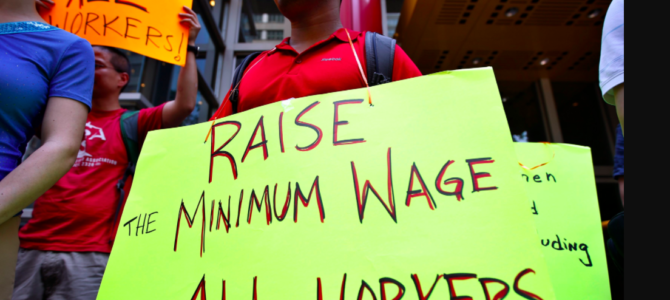A new study on Seattle’s minimum wage hike is a teachable moment for American liberals—a time to think harder about the effects of a policy they favor and think better of their fellow Americans who oppose it. The second lesson may be even more valuable than the first.
Researchers at the University of Washington issued a study this week on the city’s $13 minimum wage suggesting it’s not good for the workers it was meant to help. The city enacted a gradual hike in the minimum wage in 2014, with the first raise to $11 starting in 2015, and $13 in 2016.
In the second in a series of studies commissioned by the city to study the policy, University of Washington researchers found, among other things, that “the minimum wage ordinance lowered low-wage employees’ earnings by an average of $125 per month in 2016,” and “caused hours worked by low-skilled workers …to fall by 9.4% during the three quarters when the minimum wage was 13 per hour. “ The result, the study maintains, is employers find, “the work of least-paid workers might be performed more efficiently by more skilled and experienced workers commanding a substantially higher wage. This work could, in some circumstances, be automated. In other circumstances, employers may conclude that the work of least-paid workers need not be done at all.”
This study is especially credible for several reasons: 1) It was commissioned by the city to study the policy’s impact. 2) As a result, these researchers had access to detailed hours and wage data others didn’t, and 3) When the same team produced more favorable results for the wage hike at the first phase of its increase to $11, minimum-wage advocates lauded it.
The original study, at $11 per hour, found “the city’s low-wage workers earned more, but that effect was muted by reduced hours, and the effects canceled each other out almost completely. This was hailed by the minimum wage lobby as a data point in its favor, especially because it was supplemented by a finding that the higher minimum wage hadn’t driven employers out of business.”
That seems like a low bar for those who championed this cause, and perhaps a tip-off on how badly this could potentially go. This study is vexing to fight-for-$15 activists both for its credibility and its alignment with conservative arguments against aggressive minimum-wage hikes. It has policy and ideological implications that those who support a minimum wage hike are facing with varying degrees of engagement or pique.
But there’s a silver lining. They can, if they choose, stop thinking of their fellow citizens as monsters hell-bent on making life harder for low-income working people. Perhaps it’s the opposite—they just wanted to avoid unintended consequences of hurting low-income workers with a policy that sounds generous but is anything but in practice.
As a wage-hike proponent, you are free to quibble with this study, as one can any study. Researchers themselves say they left out chain establishments in food and retail because they didn’t have sufficient data on them, and the paper has yet to be peer-reviewed. What you shouldn’t dismiss is the possibility that your fellow Americans who disagree with you on this issue do so because they are concerned about the economic well-being of the cities trying this and the workers who are supposed to benefit.
It matters if the worker isn’t helped, and is even hurt, by this policy. If a minimum-wage hike’s biggest uptick is in virtue signaling for the rich and well-educated, not well-being for workers, the policy is a failure. If there is credible research to support this notion, there’s reason to believe your fellow Americans are being honest when they argue against it. Embrace that.
The same goes for Medicaid reform, about which there have been histrionics this week as Republicans propose changes to the federal program’s structure in their health bill. The changes are “evil,” “mean,” the “Death Party’s” attempt to kill “thousands.”
The Pacific Northwest offers another credible, landmark study on the health benefits of this program, authored in part by Jonathan Gruber, no less than the architect of the Affordable Care Act. In 2013, a randomized, controlled trial (the gold standard of such research and one of very few of its kind in public policy) revealed Medicaid “generated no significant improvement in measured physical health outcomes” over being uninsured.
Again, feel free to argue with the conclusions of this study, or cite others, but it exists and it’s credible. Medicaid as it was in 2013 was failing those it was meant to serve. When Obamacare increased enrollment in Medicaid programs, flooding it with mostly able-bodied citizens above the poverty line to whom resources are being allocated at the same or greater rate than the most vulnerable the program was meant for, it stands to reason that wouldn’t go well for those who were already poorly served by it.
No one has to give up his or her beliefs here. But there’s good reason to stop assuming everyone who disagrees with you is a monster who wants to hurt poor people, and start asking yourself why you’re a monster who wants to hurt poor people. Oh, I kid. Even if you don’t bother with the policy lesson, the lesson about people is a good one, too.










